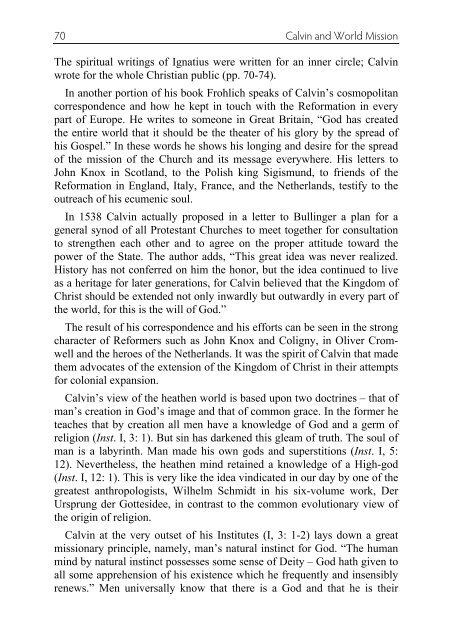Calvin and Missions - World Evangelical Alliance
Calvin and Missions - World Evangelical Alliance
Calvin and Missions - World Evangelical Alliance
Create successful ePaper yourself
Turn your PDF publications into a flip-book with our unique Google optimized e-Paper software.
70 <strong>Calvin</strong> <strong>and</strong> <strong>World</strong> Mission<br />
The spiritual writings of Ignatius were written for an inner circle; <strong>Calvin</strong><br />
wrote for the whole Christian public (pp. 70-74).<br />
In another portion of his book Frohlich speaks of <strong>Calvin</strong>’s cosmopolitan<br />
correspondence <strong>and</strong> how he kept in touch with the Reformation in every<br />
part of Europe. He writes to someone in Great Britain, “God has created<br />
the entire world that it should be the theater of his glory by the spread of<br />
his Gospel.” In these words he shows his longing <strong>and</strong> desire for the spread<br />
of the mission of the Church <strong>and</strong> its message everywhere. His letters to<br />
John Knox in Scotl<strong>and</strong>, to the Polish king Sigismund, to friends of the<br />
Reformation in Engl<strong>and</strong>, Italy, France, <strong>and</strong> the Netherl<strong>and</strong>s, testify to the<br />
outreach of his ecumenic soul.<br />
In 1538 <strong>Calvin</strong> actually proposed in a letter to Bullinger a plan for a<br />
general synod of all Protestant Churches to meet together for consultation<br />
to strengthen each other <strong>and</strong> to agree on the proper attitude toward the<br />
power of the State. The author adds, “This great idea was never realized.<br />
History has not conferred on him the honor, but the idea continued to live<br />
as a heritage for later generations, for <strong>Calvin</strong> believed that the Kingdom of<br />
Christ should be extended not only inwardly but outwardly in every part of<br />
the world, for this is the will of God.”<br />
The result of his correspondence <strong>and</strong> his efforts can be seen in the strong<br />
character of Reformers such as John Knox <strong>and</strong> Coligny, in Oliver Cromwell<br />
<strong>and</strong> the heroes of the Netherl<strong>and</strong>s. It was the spirit of <strong>Calvin</strong> that made<br />
them advocates of the extension of the Kingdom of Christ in their attempts<br />
for colonial expansion.<br />
<strong>Calvin</strong>’s view of the heathen world is based upon two doctrines – that of<br />
man’s creation in God’s image <strong>and</strong> that of common grace. In the former he<br />
teaches that by creation all men have a knowledge of God <strong>and</strong> a germ of<br />
religion (Inst. I, 3: 1). But sin has darkened this gleam of truth. The soul of<br />
man is a labyrinth. Man made his own gods <strong>and</strong> superstitions (Inst. I, 5:<br />
12). Nevertheless, the heathen mind retained a knowledge of a High-god<br />
(Inst. I, 12: 1). This is very like the idea vindicated in our day by one of the<br />
greatest anthropologists, Wilhelm Schmidt in his six-volume work, Der<br />
Ursprung der Gottesidee, in contrast to the common evolutionary view of<br />
the origin of religion.<br />
<strong>Calvin</strong> at the very outset of his Institutes (I, 3: 1-2) lays down a great<br />
missionary principle, namely, man’s natural instinct for God. “The human<br />
mind by natural instinct possesses some sense of Deity – God hath given to<br />
all some apprehension of his existence which he frequently <strong>and</strong> insensibly<br />
renews.” Men universally know that there is a God <strong>and</strong> that he is their

















